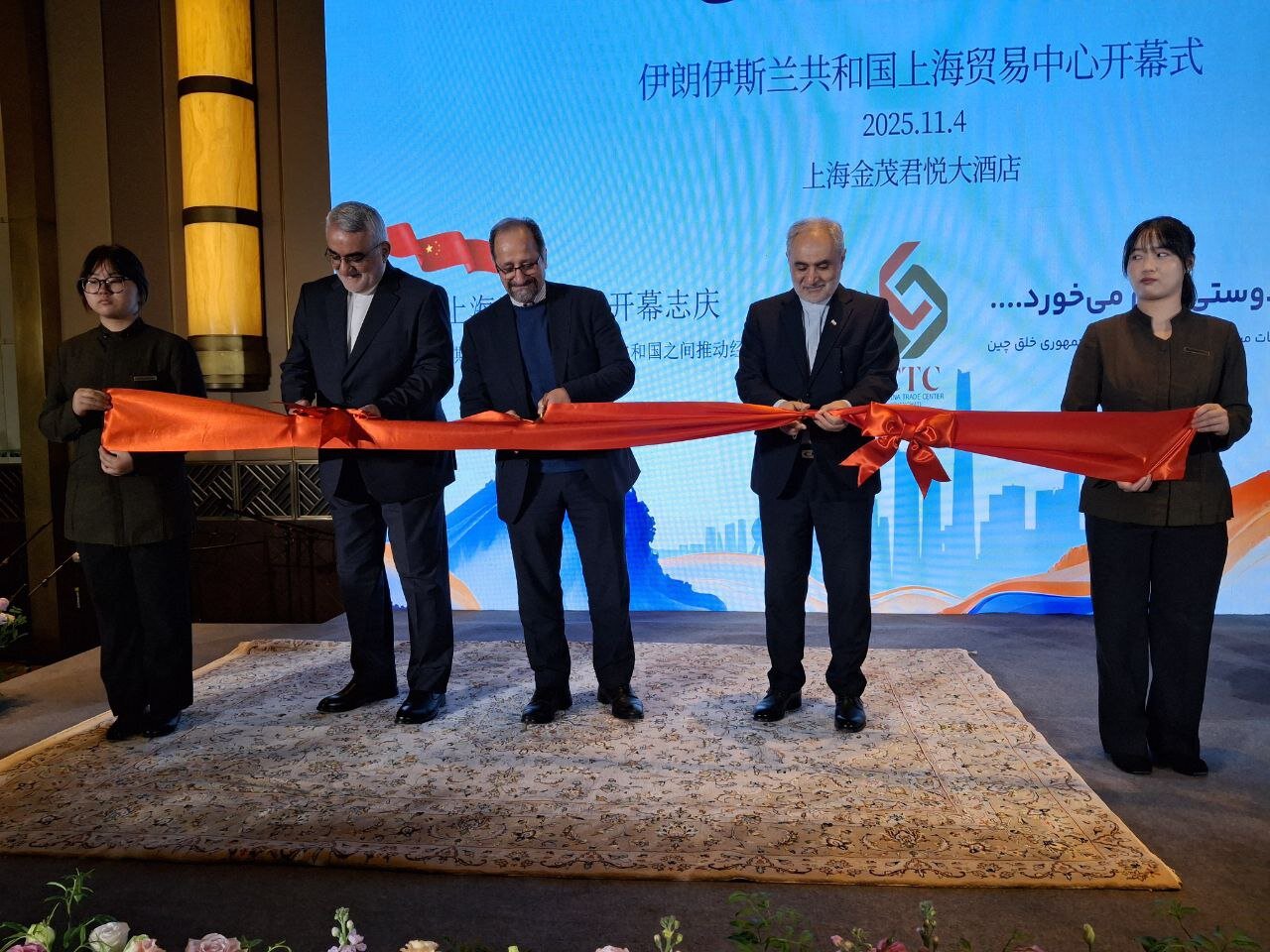Iran opens trade development center in Shanghai, signs deal with Hangzhou trade council

TEHRAN – Iran inaugurated its Trade Development Center in Shanghai in a ceremony attended by Tehran Chamber of Commerce Chairman Mahmoud Najafi Arab and Secretary General Fereydoun Vardinejad, honoring Vardinejad for his role in strengthening Iran–China ties.
The event also brought together former Iranian ambassador to China Alaeddin Boroujerdi, Iran’s Consul General in Shanghai Ali Mohammadi, and a group of Iranian and Chinese business leaders.
Vardinejad, who previously served as ambassador to Beijing, called for deeper private-sector cooperation between the two countries amid “intense global competition and Western efforts, particularly by the United States, to marginalize Asia’s role in global value chains.”
He proposed the creation of a digital barter platform enabling trade in yuan and rial with the support of both central banks, and urged Iran and China to expand collaboration in regional and global coalitions to counter unilateral sanctions and promote multilateral trade based on law and mutual agreement.
TCCIMA signs MOU with Hangzhou trade council to boost cooperation in advanced technologies
In a related meeting, the Tehran Chamber of Commerce delegation, led by Najafi Arab, met with the Deputy Director of the Hangzhou Council for the Promotion of International Trade and signed a memorandum of understanding to boost trade and technology exchanges, particularly in advanced and digital industries.
Najafi Arab expressed hope that the talks would “open new economic gateways” between the two countries, citing Hangzhou’s strength in electronics, innovation, and technology infrastructure.
He said the agreement could lead to cooperation on smart industrial parks, digital economy initiatives, and educational partnerships between Tehran’s Innovation and Digital Transformation Center and its counterparts in Hangzhou.
The Tehran Chamber delegation, which includes two lawmakers, is in Shanghai to attend the China International Import Expo (CIIE) and promote private-sector collaboration in trade and technology.
During a forum on economic cooperation opportunities between Iran and China, held in Tehran on November 4, Tan Kai, President of the Iran Federation of Overseas Chinese Association, said that Chinese companies view Iran as an appealing destination for industrial investment.
Tan noted that bilateral trade between Iran and China reached $13.4 billion last year, adding that the figure could rise substantially through expanded cooperation.
He emphasized Iran’s role as a key member of the Shanghai Cooperation Organization (SCO) and said Chinese firms are particularly interested in developing partnerships in industrial sectors.
He added that China is home to over 58 million private factories, offering diverse and flexible models of foreign investment that could help support Iran’s economic growth.
Former Economy Minister Ehsan Khandouzi, also speaking at the meeting, underlined the importance of strengthening Iran’s economic ties with eastern partners. He said that amid sanctions, strategic collaboration with China could play a vital role in mitigating economic pressures.
Meanwhile, Hamed Vafaee, professor of Chinese studies at the University of Tehran, said relations between the two countries need deeper transformation and mutual understanding. He noted that Iran remains an indispensable partner in China’s global development trajectory, underscoring the necessity of broadening bilateral cooperation.
In early October, Majid-Reza Hariri, the chairman of the Iran-China Joint Chamber of Commerce, commented on the extent to which the UN Security Council sanctions would affect Iran-China relations, and stated: "Given that none of the UN sanctions are trade-related and instead pertain to the nuclear industry and some sectors of the country's missile industries, consequently, they should not impact our normal trade with China."
He added: "Although the U.S. sanctions have completely prohibited oil sales, we see that the Chinese are currently buying nearly over 90 percent of the country's oil. Therefore, UN sanctions are not related to the commercial sphere and logically should not affect these types of relations either."
Hariri further added: "The UN sanctions will have psychological and secondary effects which must be examined."
EF/MA
Leave a Comment